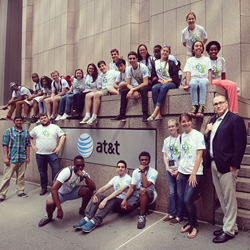Pace University STEM Summer Camp Teaches App Design
After participating in a two-week coding and design camp, 16 high school students from across New York recently debuted their own mobile apps as part of a two week summer camp designed to foster coding and design skills.
The STEM Collaboratory Camp, held at New York’s Pace University, brought together students from around the city with existing interests in math, science, and technology. The students learned basic skills in coding, robotics, cyber security, design, and more, and then worked in teams with a mentor to design and execute a number of smartphone apps.
In addition to the classes, students in the program participated in workshops and field trips to places like AT&T’s cyber security facility (AT&T sponsored the program).
Launched in 2012, the university’s STEM Collaboratory encourages STEM teaching and learning among students and teachers through conferences, professional development, and work with regional science and technology professionals.
A list of apps previously created by students through the program -- many of which combine STEM subjects like chemistry and physics with logic and word games -- is available online.
About the Author
Stephen Noonoo is an education technology journalist based in Los Angeles. He is on Twitter @stephenoonoo.